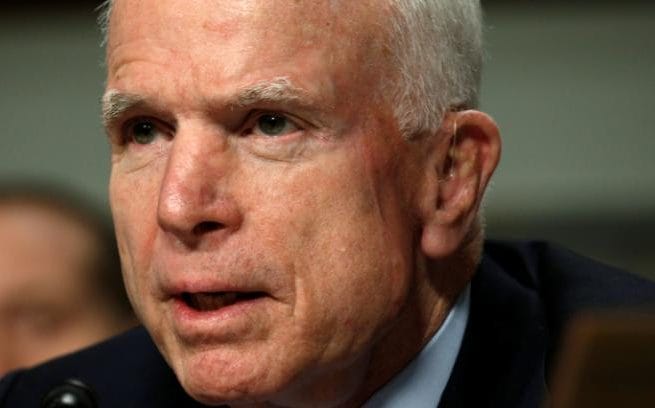Turkey-Kurd Tension in Syria War a ‘Train Wreck,’ McCain Warns

EghtesadOnline: Senator John McCain warned of a looming “train wreck” over tensions between Turkey and Kurdish factions as the war against Islamic State moves toward the terrorist group’s stronghold in Syria.
Turkey and the Kurds may end up fighting each other instead of working together with the U.S. to capture Islamic State’s Syrian base of Raqqa, McCain, the chairman of the Senate Armed Services Committee, said Thursday as the panel heard testimony from the top U.S. commander in the Middle East.
According to Bloomberg, President Recep Tayyip Erdogan considers Kurdish forces helping the U.S.-led coalition to combat Islamic State to be terrorists with links to separatists in Turkey. The U.S. so far has considered a force including Kurds as the most effective to lead the initial push into Raqqa.
“Unless something changes, I foresee a train wreck here,” said McCain, an Arizona Republican. “I’m not sure that the administration recognizes how seriously” Erdogan views the Kurds as a threat, he said.
Army General Joseph Votel, who heads U.S. Central Command, told the Senate panel the U.S. isn’t aligned against Turkey -- calling it a “vital partner” -- and understands its concerns.
The U.S. is trying to “work through this tension through dialogue, through information and through identifying the alternatives that they give us a way to move forward against ISIS without damaging the long-term relationship with a NATO partner,” Votel said, using an acronym for Islamic State.
In preparation for the drive to eject Islamic State from Raqqa, a U.S. Marine Corps artillery unit and a team of U.S. Army Rangers were recently positioned in Syria, Air Force Colonel John Dorrian, spokesman for U.S.-led coalition against Islamic State, said Thursday in an email. The aim was to have “redundant” fighters to support partners on the ground fighting Islamic State, Votel said.
In testimony on other hot spots:
- Afghanistan: Votel said more U.S. troops will be needed. He said Central Command is discussing with Defense Secretary James Mattis how to break what he acknowledged is a stalemate.
“I do believe it will involve additional forces to ensure that we can make the advise-and-assist mission more effective,” he said. There’s also the challenge of sustaining Afghan forces, which have“absorbed a lot of casualties,” he added.
- Yemen: Votel said the U.S. “lost a lot” in the Jan. 28 raid against al-Qaeda in the Arabian Peninsula by the Navy’s SEAL Team 6, in which a U.S. serviceman was killed. There was an “exhaustive after-action review,” looking for indicators of incompetence and bad judgment, Votel said. The mission resulted in four to 12 civilian casualties, according to Votel. “I accept responsibility,” he said.
In Yemen’s civil war, Votel attributed civilian casualties from airstrikes by the Saudi Arabia-led coalition fighting Shiite Houthi rebels to the “competence of the forces” carrying out the air campaign. The U.S. provides logistical and intelligence support to the Saudi coalition. The general said he and other U.S. military leaders have engaged the Saudis about how to improve their strike capabilities.
- Iran: The Islamic Republic and its proxies continue to perpetrate “malign activities” across the region, Votel said. “It is my view that Iran poses the greatest long-term threat to stability for this part of the world,” he said.
He called Iran’s aggressive maritime actions in the Middle East “unprofessional, unsafe and abnormal.” Votel said: “We have to hold Iran accountable for their actions. No other nation operates the way they do” in the Persian Gulf.
Also at the hearing, Marine General Thomas Waldhauser, who leads U.S. Africa Command, said Islamic State is making inroads into Somalia, which will test African Union forces and the local government that’s already contending with al-Shabab, an al-Qaeda-backed group. Other militant threats on the continent include Islamic State in Libya and West Africa as well as Boko Haram.
“The instability in Libya and North Africa caused by years of political infighting may be the most significant near-term threat to the U.S. and allies’ interests on the continent,” Waldhauser said.


